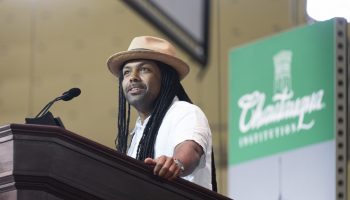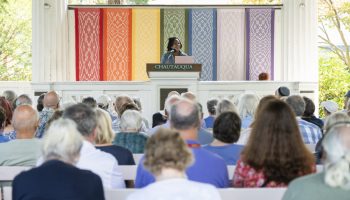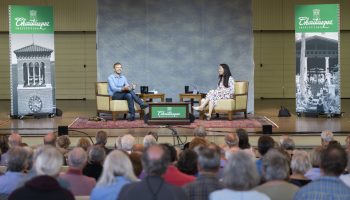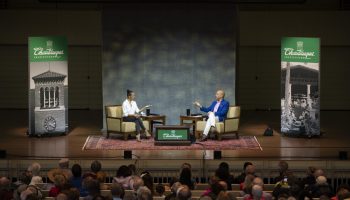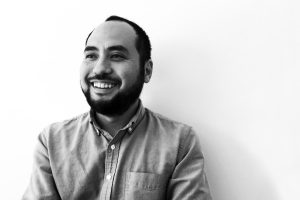
Brandon Som credits his devotion to poetry to a couple of things. One: Like many budding young writers, he was lucky enough to have a few “great” English teachers in high school. And two: Music and lyrics, primarily from family record collections, saturated his young life.
“There was a ritual of taking (the record) out, holding it and dropping the needle,” Som said.
He remembers his father’s eclectic mix of soul, disco and funk, and the “cowboy country music” that permeated his hometown of Phoenix. It was music interested in heartbreak and relationships — music that, according to Som, “told stories.”
The author of Babel’s Moon, winner of the Snowbound Prize, and The Tribute Horse, winner of the Kate Tufts Discovery Award, Som is Week Two’s poet-in-residence at the Chautauqua Writers’ Center. His week-long workshop, “An Open Line to the World,” is both a technical exploration of the poetic line and a meditation on the ways the line may lead a poet to community. Som will deliver his Brown Bag lecture at 12:15 p.m. today on the porch of the Literary Arts Center at Alumni Hall. Titled “Made to Be Broken: Looking at Verse in Relation to Prose,” Som’s lecture will consider the relationship between verse and prose, teaching through “opposites.”
“For me, as a student, as someone who studies poetry in general, working through distinctions or contradistinctions is often a good way to learn,” Som said. In questioning how metrical structure affects lines, Som hopes to think about “the urgency of verse, why verse matters.”
To accomplish this, Som will look at examples of 20th and 21st century poets who adapted previously published passages of prose by other authors, transforming them into a new text of verse.
Traveling Stanzas, the exhibit from Kent State University’s Wick Poetry Center that currently occupies the Hultquist Center’s Poetry Makerspace, emulates this same practice of “found poetry” or “blackout poetry.” On both the Emerge app or at the Listening Wall, Chautauquans may select words or phrases from digital texts, reconfiguring them to create new meaning.
Encompassing “sound, source and lineage,” Som’s current project Tripas is a collection of poems that plays with the inherent connection between language and heritage. Som grew up in and around Empire, a corner store owned and operated by his Chinese American father and grandparents, while his Chicana grandmother, Pastora Mendoza, raised him. For 30 years, Mendoza worked on the assembly line at a Motorola plant in Phoenix where she would assemble some of the first cellular phones.
“Examining the fused wiring between Spanish, Chinese and English, the poetry enacts a kind of ‘telephone’ between these languages — thus echoing my own experience growing up with a mix of my family’s languages as a primarily heard, rather than written, phenomenon,” Som said.
On a macro-level, the collection is an exploration of a transnational electronics industry that bridges Tijuana, Mexico, and the Mexican state of Sonora — home to maquiladoras, factories operating under preferential tariff programs — and Guangdong, China. In 1928, Som’s grandfather, Yow C. Som, immigrated from that same Pearl River Delta region in China to the United States, where he would eventually open the corner store Som frequented as a child.
Counting Adrienne Rich, Cherrie Moraga, Frances Chung and Gloria Anzaldúa as inspirations for his work, Som analogizes the poems in Tripas to “componentry” and “wiring,” noting that the book is “deeply connected” to both his teaching and study of poetry.
“The book connects family lines with poetic lines while also enacting the practice of deeply and inventively listening to family memory (memoir) in order to re-envision the present and possible futures,” he said.
Som connects the dots of his family history through verse, crossing borders and the distance across the Pacific. Whether a writer is working in traditional verse or free verse, Som said, doing so “foregrounds form and gesture.” The poet’s line is “their own kind of signature that prose writers don’t have access to.”
“It’s about a poet’s choices in not only what they say but how they say something,” he said. “That’s how to control meaning.”

